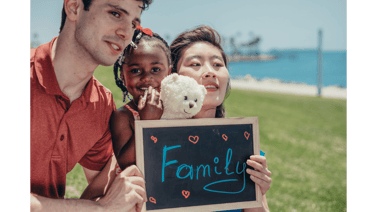 One of the more nuanced parts of becoming a foster parent is developing a positive and respectful relationship with your foster child’s biological family. Though this is an area that can cause a lot of questions and uncertainty, it is very important.
One of the more nuanced parts of becoming a foster parent is developing a positive and respectful relationship with your foster child’s biological family. Though this is an area that can cause a lot of questions and uncertainty, it is very important.
Being in good relationship with your foster child’s biological family means better emotional health for everyone. Plus, it clearly places reunification as the central goal of foster care.
Come from a Place of Compassion
We believe it is both possible to acknowledge that a child is in foster care because of parents being unable to care for them while also looking at the situation with compassion and hope for a better solution. There are many reasons why a parent may not be in a place to adequately care for their children and passing judgement is never helpful.
Statistically most children are in foster care due to neglect. This is typically caused by ignorance, immaturity, and/or addiction and not a consciously malicious intent. Knowing this doesn’t excuse birth parent’s behavior, but understanding the cause of what happened can help strengthen your own compassion.
Look at foster care as an opportunity for healing, learning, and growth for everyone – including yourself as a foster parent!
Have a Team Mindset
When it comes to managing relationships in foster care, the foster child is in the most difficult position. From their perspective, they are being separated from their biological family and placed in a new home with someone they don’t know. Even if their living situation was not safe or healthy, they still feel loyalty and connection with their family. This can cause them to feel like they are betraying their biological parents.
Even though we know foster care is never a test of a child’s “loyalty”, there are ways we can help them see that truth for themselves. Deciding to be a team with your foster child’s parents and support services is a great way to do that. By creating one unit around them that uplifts and cares for them, they can start to see everyone as being on their side and not have to choose one.
The Children’s Trust Fund Alliance created a guide in collaboration with their Birth and Foster Parent Partnership, Youth Law Center’s Quality Parenting Initiative and Casey Family Programs with tips of how to navigate relationships with your foster child’s biological family.
1. Building the relationship.
Building a positive relationship between the birth parent and the foster parent/kinship caregiver at the beginning of the involvement with the child welfare system can help allow the child or youth to maintain a sense of identity and family history and help them understand the new relationships in their life.
It also helps the birth and foster parents feel more supported. Equally important is creating healthy dialogue between foster parents/kinship caregivers and birth parents on topics about the individual needs of the children in care and their families (e.g., cultural beliefs, religious beliefs and traditions, racial and ethnic perspectives, LGBTQ issues, medical/dental history and other daily practices such as haircare, grooming, hygiene, nutrition, etc.).
2. Supporting the relationship.
Children and youth benefit by feeling safer and learning healthy communication skills when they see the foster parents/kinship caregivers and birth parents working together. Children and youth can realize that they do not have to choose one family over another and that adults can get through difficult situations by communicating and supporting each other. Maintaining regular contact through telephone calls, texts, visits and sharing time together are other important ways to strengthen and support relationships between the foster parent/kinship caregiver, the birth parent and the child or youth.
3. Keeping the relationship strong while working with the system and planning for reunification.
While the children or youth are in care, it will be important for the birth family and the foster parent/kinship caregiver to keep their relationship strong by working as a supportive and unified team and sharing consistent information about the child or youth with the various other professionals who may be involved in working with the family.
This will also help create a collaborative effort to support the family in working toward reunification or alternative living arrangements. During this time, the birth parent may be working on fulfilling all of the requirements of their case plan to seek reunification. The foster parent/kinship caregivers can look for ways to be supportive and the birth parent can keep the foster parent/kinship caregiver updated on their progress, concerns and any other important information.
4. Keeping the relationship strong after the birth family leaves the system.
In many situations, it is the positive and supportive relationship the birth parent experienced with the foster parent/kinship caregiver that helped the parent gain the necessary skills and tools to successfully provide a nurturing and stable home for their children or youth.
We often see parents and caregivers remain in contact with each other and provide support to each other. Some foster parents become known as “aunts’ and “uncles” to the children or youth. During post reunification, and also with alternative living arrangements, a birth parent may wish to continue to have communication and contact with foster parents/kinship caregivers to keep everyone involved as a support system for their children (e.g., similar to an extended family system). Also, the birth parent may call upon the foster parent/kinship caregivers to help them with childcare or respite care.
To see the full guide click here
Remember the Overall Goal
Seeing the support system of your foster child’s life becomes easier if you look at foster care as a part of a holistic healing process with the goal of reunification. We believe people make mistakes, but they can learn and change. The Foster Agency you go with will provide training resources and a social worker dedicated to your foster child that helps with logistics and case management. The foster child will also have support services at their school and potentially other important role models and mentors in the community.
While you are being a foster parent, hopefully the child’s biological family will be using their resources too. Eventually, your foster child will reunify with them in a healthier and safer environment. The time varies on how long children are in foster care, so be patient and trust the process.
While we no longer provide foster services, we remain dedicated to supporting you by connecting you with foster care agencies in your region to access the resources you need.
In addition to our core services, Victor actively collaborates with local programs, workshops, and schools to raise awareness and deliver essential support. By combining immediate assistance with strategies for lasting success, our holistic approach ensures meaningful and sustainable impact.
For more information about our programs and how we can help, visit our website or contact us today.
